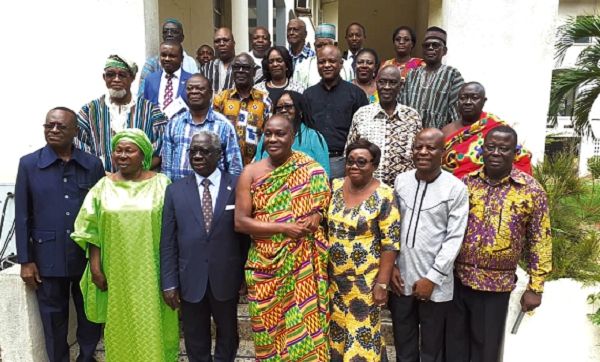
Council of State members receive briefing on Ghana Beyond Aid
The Senior Minister, Mr Yaw Osafo-Maafo, has stated that for the Ghana Beyond Aid vision to be actualised, the country needs to harness its own resources effectively and deploy them creatively and efficiently for rapid economic and social transformation.
“This will require hard work, enterprise, creativity and a consistent fight against corruption in public life.
It will also require that we break from a mentality of dependency and adopt a confident, can-do spirit, fuelled by love for our dear country,” he said.
Speaking at a meeting to brief members of the Council of State on the Ghana Beyond Aid Charter and Strategy Document, Mr Osafo-Maafo declared: “We cannot subordinate the common good to build a prosperous nation to the selfish interest of a few.”
The Senior Minister, according to a release from his office, explained that Ghana Beyond Aid was aimed at creating a prosperous and self-confident country that was in charge of its economic destiny, a “transformed Ghana that is prosperous enough to be beyond needing aid and which engages competitively with the rest of the world through trade and investment”.
He explained that the Ghana Beyond Aid document was not a development plan but a call for a paradigm shift through attitudinal and mindset changes by all citizens of the country.
Not rejection
According to Mr Osafo-Maafo, Ghana was not rejecting aid or support; rather, “we should determine what the aid should be used for in order to benefit our people”.
He made it clear that there was a multi-stakeholder committee that consisted of representatives of the Ghana Trades Union Congress (TUC), the Association of Ghana Industries (AGI), the Private Enterprises Federation (PEF), the Ghana National Association of Teachers (GNAT), the Ghana National Chamber of Commerce and Industries (GNCCI), the National Union of Ghana Students (NUGS) and selected ministries.
Committees
The Senior Minister said the Ghana Beyond Aid Committee had created sub-committees, which included agricultural modernisation, finance and economy; private sector development; values and attitudinal change; labour and employment; infrastructure; human development; publicity and pubic engagement.
Those sub-committees were mandated to develop ideas and structures that would help build the strategy document, he said, adding that position papers and contributions were solicited from the public.
Institutions
Mr Osafo-Maafo said 30 institutions were invited to present position papers, with 22 responding, including academic and research institutions, civil society organisations (CSOs), professional bodies, among others.
Again, each ministry submitted an input to the outline of what could be done to support President Nana Addo Dankwa Akufo-Addo’s Ghana Beyond Aid vision.
Additionally, he said, voluntary contributions of papers and ideas from Ghanaians, both home and abroad, were received.
Mindset
The minister was emphatic that Ghana Beyond Aid would require a new mindset by all Ghanaians, the building and deepening of social partnerships involving all key stakeholders, such as labour, traditional authorities and industry, as well as a non-partisan approach to national development and a national consensus on the direction of the nation’s development.
Strategy
On the strategy to achieve the agenda, he explained that it would hinge on a 10-point reform agenda, including macroeconomic stability, higher public revenue mobilisation, greater efficiency in the use of all public resources – anti- corruption and a more professional and transparent approach, improved public infrastructure and an easier and more secure access to land.
Council of State
The Chairman of the Council of State, Nana Otuo Siriboe II, was elated about the Ghana Beyond Aid Charter and Strategy.
Majority of the members asked questions and made contributions to the document by calling on the government and the secretariat to enforce the law and also push for the successful implementation of the agenda.
Some suggestions made by the members included fighting indiscipline in relation to sanitation issues, educating the citizenry on their civic responsibilities, working effectively on the financial system of the economy, reforming the technical education system and increasing rice production and tackling general low agricultural productivity.
They also were of the view that Ghana could cut down on the large importation of rice and other agricultural produce if the government worked towards that.
The members of the council were happy that Ghana Beyond Aid had adopted a non-partisan approach and called on Ghanaians to support the agenda.

